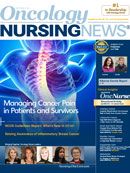Continuing Essential Cancer Treatment While Maximizing Protection of the Heart
The cardio-oncology program at Smilow Cancer Hospital at Yale-New Haven is a combined inpatient and outpatient consultative service that addresses the cardiovascular complications of cancer and its treatment.
Lauren A. Simprini, MD,
Jessica Coviello, DNP, APRN, ANP-BC, and Raymond R. Russell, MD, PhD
The cardio-oncology program at Smilow Cancer Hospital at Yale-New Haven is a combined inpatient and outpatient consultative service that addresses the cardiovascular complications of cancer and its treatment. This innovative program is one of the few in the United States dedicated to addressing the cardiovascular side effects of cancer therapy and maximizing cardiovascular outcomes for cancer survivors.
Working together as a team in the care of the cancer patient, the goal of the program is to minimize cardiotoxicity during cancer treatment and cardiovascular risks during cancer survival.
The program was launched in 2011 in response to emerging data that indicate that newly developed drugs for cancer treatment are having unanticipated side effects. Drugs such as Herceptin, an effective drug in the treatment of breast cancer, can have cardiotoxic side effects that are just beginning to be understood and researched. Similarly, some of the new, targeted chemotherapeutic agents can affect heart and vascular function or the electrical conduction system of the heart. Led by cardiologists with expertise in cardiac imaging, the cardio-oncology team members work closely with Smilow oncologists to ensure patients can continue essential cancer treatment while maximizing the protection of their hearts. In addition, the program has a holistic, preventive approach that focuses on wellness in survivorship.
A comprehensive cardiovascular assessment prior to starting chemotherapy is not currently part of the standard cancer treatment in cancer centers, but protocols at Smilow include this important assessment.
The American Heart Association (AHA) recommends that cardiovascular screening tests begin at age 20. Although many patients have had some part of the assessment done in the past, it is rare that a recent, complete assessment has been performed.
This is an essential part of care at Smilow and provides the baseline information to insure cardiovascular health with close monitoring.
The extent of cardiotoxicity is variable, depending on the type of drug used, combination with other drugs, prior chest radiotherapy, and the presence of cardiovascular risk factors or history of heart disease prior to treatment.
Known risk factors for cardiotoxicity from certain chemotherapeutic agents include age over 65 years, preexisting heart disease, as well as exposure to multiple cardiotoxic agents or radiation therapy. Other cardiovascular risk factors that warrant treatment include hypertension, dyslipidemia, diabetes, and obesity.
Additional risk factor stratification involves a thorough history and fasting laboratory tests that include a standard lipid profile as well as glucose, serum insulin, and lipoprotein-a. A baseline 3D echocardiogram to measure left ventricular function is done and repeated every 3 to 6 months during treatment depending upon the chemotherapy protocol.
Cardio-Oncology Program Goals
- Provide care for patients with cardiovascular risk factors or coexisting heart disease who now have to undergo cancer treatment.
- Establish care for patients with heart failure following traditional treatments associated with cardiac dysfunction, including anthracyclines, radiation, and newer agents.
- Study the potential cardiovascular complications of cancer and cancer therapy and establish treatment strategies for these complications.
- Provide presurgical and prechemotherapeutic cardiovascular risk assessment.
The calculation that is commonly used to describe the function of the left ventricle is called the ejection fraction. The left ventricular ejection fraction (LVEF) is stated as a percentage and represents blood being pumped out of the heart with each beat.
A normal heart pumps a little more than half of the heart’s blood volume with each beat. Normal LVEF ranges from 55% to 70%. An LVEF of 55, for example, means that 55% of the total amount of blood in the left ventricle is pumped out with each heartbeat. The LVEF may be lower when the heart muscle has become damaged due to a heart attack, heart muscle disease (cardiomyopathy), or other causes such as cardiotoxivcity. An EF of less than 40% may confirm a diagnosis of heart failure. Someone with diastolic failure can have a normal EF but show other signs that their heart is tired, such as left ventricular hypertrophy. If the ejection fraction is abnormal before chemotherapy or drops 15% during treatment, the cardio-oncology team prescribes medicine to normalize the heart function and protect it from further changes. A beta blocker or ACE inhibitor might be added. These drugs have been shown to have cardiac benefit in clinical trials in Europe.1
A heart-healthy diet and daily walking are recommended to patients; 30 minutes of daily walking or other forms of aerobic activity are encouraged. Patients who exercise through their treatment report feeling healthier and stronger as they complete therapy. The cardio-oncology team will continue to monitor patients throughout treatment and yearly for the first 5 years following cancer therapy. The team includes two cardiologists with expertise in cardiac imaging and an advanced practice nurse who work closely with Smilow oncologists to ensure that patients can continue essential cancer treatment while maximizing the protection of their hearts.
The cardio-oncology and oncology teams work closely to develop diagnostic and therapeutic plans aimed at providing the greatest protection to the heart while supporting optimum cancer therapy for the patient (Box).
Reference
- 1. Curigliano G, Cardinale D, Suter T, et al. Cardiovascular toxicity induced by chemotherapy, targeted agents and radiotherapy: ESMO Clinical Practice Guidelines. Ann Oncol. 2012;23(suppl 7):vii155-vii166.

Innovative Program Reduces Nurse Turnover and Fosters Development
Published: September 12th 2024 | Updated: September 12th 2024The US Oncology Network (The Network) has developed one of the most comprehensive programs in the nation to support the professional development and retention of new oncology nurses.



